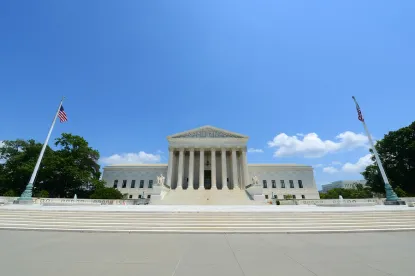Whether a federal court of appeals has jurisdiction to review an order denying class certification after the named plaintiffs voluntarily dismiss their claims with prejudice was the issue before the U.S. Supreme Court on March 21, 2017, when the Court heard oral argument in Microsoft Corporation v. Baker, No. 15-457. If this controversial procedural mechanism is allowed, a named plaintiff would be able to simply agree voluntarily to dismiss his or her claims with prejudice, then appeal the unfavorable judgment against class certification.
The case was slated for oral argument last year, but ultimately was delayed after the death of Justice Antonin Scalia.
Currently, in line with Federal Rule of Civil Procedure 23(f), courts have discretion to decide whether to allow immediate appeals of orders granting or denying class certification; but, more often than not, these petitions for appeal are denied. The questioning that occurred at the March 21 oral argument showed that several justices are concerned with, among other things, the flood of class action appeals that could result if this procedural tool is allowed.
Background
The ruling on a motion for class certification is a critical one for any class action. In Coopers & Lybrand v. Livesay, 437 U.S. 463 (1978), the Supreme Court held that an order granting or denying class certification is not a “final” order within the meaning of 28 U.S.C. § 1291, the general rule that appeals can be taken only from a final judgment.
In 1998, the addition of Rule 23(f) permitted appeals of orders granting or denying class certification. The decision to allow an appeal is entirely discretionary. If a defendant receives a ruling granting class certification and his or her request to appeal pursuant to Rule 23(f) is denied, the defendant must continue to litigate the case on a class basis or settle the claims. Since 1998, however, plaintiffs have attempted to circumvent this process by adding another option, albeit only to the benefit of the plaintiffs’ bar. If plaintiffs receive an order denying class certification, they can seek a voluntary dismissal with prejudice, then file an appeal to challenge this denial, arguing that the case dismissal amounts to a final judgment under 28 U.S.C. § 1291. Whether plaintiffs can do this, soon will be answered by the Supreme Court.
Procedural History
In 2007, Seth Baker and others brought a putative class action over an alleged design defect in a Microsoft video-game console. The district court denied class certification, in part reasoning that requirements of individual attention to each plaintiff on issues of law and fact made the case an “inappropriate candidate for class-action resolution.”
The plaintiffs petitioned the U.S. Court of Appeals for the Ninth Circuit, in San Francisco, for interlocutory review to appeal the class certification ruling under Rule 23(f). They argued that the class certification denial constituted a “death knell” for the litigation, because their individual claims were too small to justify litigation on their own to final judgment. The Ninth Circuit denied their petition and remanded the case to the district court. Subsequently, the plaintiffs resolved their individual claims voluntarily through an agreement with Microsoft and the court dismissed their claims with prejudice.
In 2011, the same attorneys who represented the plaintiffs filed a new lawsuit on behalf of a handful of Xbox 360 owners who did not join the original action, pressing the same claims. The district court struck their class allegations. Invoking Rule 23(f), they requested permission to appeal the district court’s order striking their class allegations. The Ninth Circuit denied the petition.
Thereafter, they chose not to prosecute their individual claims; instead, they promptly requested the district court to dismiss their claims with prejudice. Microsoft stipulated to the dismissal of the claims, but made it clear their position was that the “Plaintiffs will have no right to appeal the Court’s Order striking Plaintiffs’ class allegations after entry of their requested dismissal.” However, the Ninth Circuit, relying on Berger v. Home Depot USA, Inc., 741 F.3d 1061 (9th Cir. 2014), accepted the plaintiffs’ appeal and reversed the district court’s decision rejecting class-based adjudication. The Ninth Circuit stated that “in the absence of a settlement, a stipulation that leads to a dismissal with prejudice does not destroy the adversity in that judgment necessary to support an appeal” of a class certification denial.
Highlights of Oral Argument
Arguing on behalf of Microsoft, Jeffrey L. Fisher emphasized that the Federal Rule of Civil Procedure rules committee had considered what procedural options should be available to plaintiffs who found themselves in precisely the situation the plaintiffs in this case have found themselves and to allow them to use the voluntary dismissal tactic that they wish to use would “upend” the carefully considered rule. Fisher reiterated that when plaintiffs voluntarily dismissed their claims with prejudice, their claims are gone forever and cannot be revived. On the other hand, Fisher argued, if they could revive those claims somehow, then the decision was not really “final,” and therefore, does not qualify for appellate review. Further, he noted the very real costs on the judicial system that would be imposed by a right to an automatic appeal. Additionally, he argued that defendants would be forced to submit to a tactic that has no corresponding option — that is, when class certification is granted, there is no way to similarly manufacture an automatic right to appeal.
Counsel for the plaintiffs, Peter K. Stris, defended the voluntary dismissal tactic, explaining that the parties litigated the case as if the claims would “spring back to life” and outlined why he believed that was permitted. Justice Elena Kagan appeared skeptical to this argument. She asked, “Is this a procedure that’s used in the Ninth Circuit? … Why did people think that this was the governing law?”
Justice Ruth Bader Ginsburg raised procedural concerns with the plaintiffs’ tactics. She noted that the rule makers went through “a lot of work” to figure out what to do with an interlocutory ruling on class action status. She questioned how the voluntary dismissal device was anything other than “a way to get around 23(f).” Justice Ginsburg went even further. She stated that if they had wanted to, the rule makers could have made class action decisions go up on appeal as of right or asked Congress to make it so, similar to a preliminary injunction. Stris responded that the tactic was necessary and, without it, class actions involving small amounts of monetary damages would be nearly impossible to pursue.
Chief Justice John Roberts questioned how the plaintiffs can tell the district court to enter a judgment against them, but then argue that it should not have done that. Stris responded that the plaintiffs did not consent to the dismissal; their request for a voluntary dismissal came with a condition, he said.
Justice Stephen Breyer struggled with the dilemma that he said existed with the plaintiffs’ position: “If you say I condition my dismissal upon my later appealing, you run into our case ... which says then the judgment isn’t final. But if you don’t reserve something, you’re in the box you’re in right now and the case is over.”
Both Justices Breyer and Ginsburg remained seemingly convinced that this was merely a way to avoid Rule 23(f) when advantageous for plaintiffs to do so.
Jeffrey Fisher closed his rebuttal argument by stating this case could have serious implications and urged the Court to rule for Microsoft and leave the status quo.
Considerations
While great minds may differ over the appropriateness of an automatic versus a discretionary appeal of a class certification order, the procedural tactic utilized by plaintiffs in this case seems too one-sided and unrealistic to be accepted uniformly by a majority of the justices. Significantly, Rule 23(f) would be changed significantly if the Fairness in Class Action Litigation Act of 2017 passes. The bill has passed in the House and is in the Senate. If passed, the bill would allow class certification orders to be appealed as of right. We will continue to follow this case closely and inform you once the Supreme Court issues a ruling.





 />i
/>i
